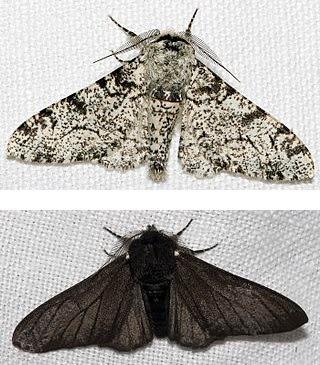The Peppered Moth and Evolutionary Fake News
On the plus side, Darwin bots can get away with bad science, dishonesty, and outright fraud for decades. However, the down side is that the embarrassing truth is often discovered. Those of us who appreciate truth in science (and science reporting) do not cotton to being deceived for the sake of getting us to believe in evolution.
One of the oldest "proofs" of evolution is the peppered moth. Essentially, the dark version supposedly alighted on soot-covered trees in England and were left alone while the light version was victuals for birds. The population of the lighter critters decreased. "Aha! Evolution! Hail Darwin, blessed be!" No. Most of the story was fake news.
Actually, it may have been an example of natural selection (a concept that creationists also accept), but they were still moths. Nothing changed into something else. I get to cognating that people are very gullible when it comes to what "scientists say", whether real ones or failed television comedians. Basic observation should tell practically anyone that there were no significant changes. Asking questions about research to back the assertions would have been helpful, whether street waif or scientist, and anyone in between.
On a similar note, Dr. James White says that we must "demythologize scholarship". Just because someone has a bunch of letters after their name does not mean you cannot challenge their presuppositional errors.
A more recent genetic study confirms that there was no evolution. Yippie ky yay, secularists! Moths were created to be moths, and not to turn into something completely different.
 |
| Light and dark varieties of peppered moths Credit: both from Wikimedia Commons / Olaf Leillinger (link to top is here, link to bottom is here) |
Actually, it may have been an example of natural selection (a concept that creationists also accept), but they were still moths. Nothing changed into something else. I get to cognating that people are very gullible when it comes to what "scientists say", whether real ones or failed television comedians. Basic observation should tell practically anyone that there were no significant changes. Asking questions about research to back the assertions would have been helpful, whether street waif or scientist, and anyone in between.
On a similar note, Dr. James White says that we must "demythologize scholarship". Just because someone has a bunch of letters after their name does not mean you cannot challenge their presuppositional errors.
A more recent genetic study confirms that there was no evolution. Yippie ky yay, secularists! Moths were created to be moths, and not to turn into something completely different.
To read the rest of this rather short article, click on "Peppered Moth Still Not Evolving".Back in 2003, ICR founder Dr. Henry Morris explained a few ways evolutionists themselves criticized the use of the peppered moth as an example of evolutionary beliefs. New genetic research validates those criticisms.The moth earned fame as a key player in a classic evolutionary story in the late 19th century. In England, a population of peppered moths supposedly shifted their coloring from mostly white to mostly black after soot from the industrial revolution darkened their tree-trunk homes. According to the tale, bird predators had a difficult time seeing the now-camouflaged dark moths, so those moths began to thrive.That story helped rescue Darwin's conception of natural selection from a round of early 20th century criticisms, such as a lack of supporting field evidence.